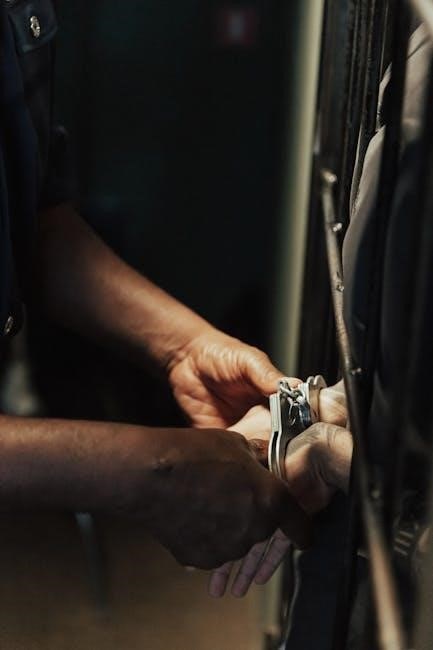security guard responsibilities pdf
Security guards play a critical role in maintaining safety and protection by patrolling premises, monitoring activities, and responding to emergencies. Their duties ensure compliance with legal standards, vigilance, and teamwork to safeguard people and property effectively while upholding professional protocols.
Overview of Security Guard Roles
Security guards are essential for maintaining safety and protection in various settings, including residential, commercial, and industrial areas. Their primary focus is on preventing threats, ensuring visibility to deter potential incidents, and remaining vigilant to monitor surroundings effectively. Key responsibilities include patrolling premises, managing access control, and responding to emergencies. They also collaborate with teams to address security concerns and maintain detailed logs of incidents and activities. Their role is critical in safeguarding people, property, and assets while adhering to legal and ethical standards. By performing these duties, security guards contribute significantly to overall security management and operational continuity.
Importance of Understanding Responsibilities
Understanding security guard responsibilities is crucial for ensuring effective protection of people, property, and assets. Clear knowledge of roles enables guards to act decisively, preventing potential threats and minimizing risks. It fosters accountability, ensuring adherence to legal and ethical standards while performing duties like patrolling, monitoring, and reporting incidents. Proper understanding also enhances teamwork, allowing guards to collaborate seamlessly with supervisors and other personnel. By grasping their responsibilities fully, security guards can maintain professionalism, uphold safety protocols, and build trust with the communities they serve. This comprehension is vital for delivering reliable security services and addressing emergencies efficiently.
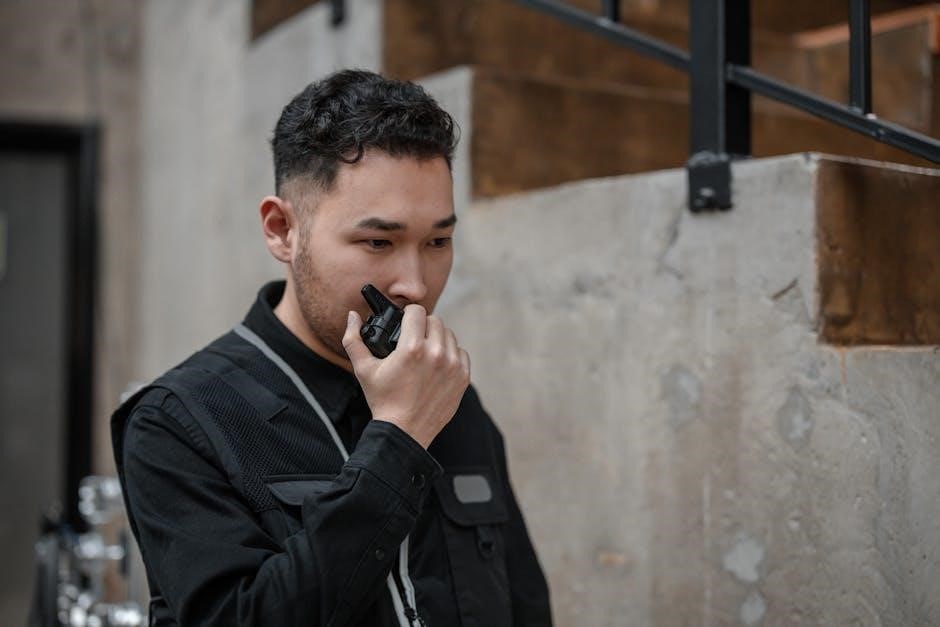
Legal and Professional Framework
Security guards must operate within a defined legal and professional framework, adhering to security laws, human rights standards, and ethical practices. Their actions are guided by compliance with local regulations and industry protocols to ensure lawful conduct while protecting premises and personnel. Guards must also respect privacy and confidentiality, avoiding any actions that infringe on individual rights. Professional training and certifications are essential to uphold these standards, ensuring that security personnel are equipped to handle their duties responsibly. Understanding this framework is critical for maintaining public trust and delivering security services effectively without overstepping legal boundaries.

Essential Roles and Responsibilities of Security Guards
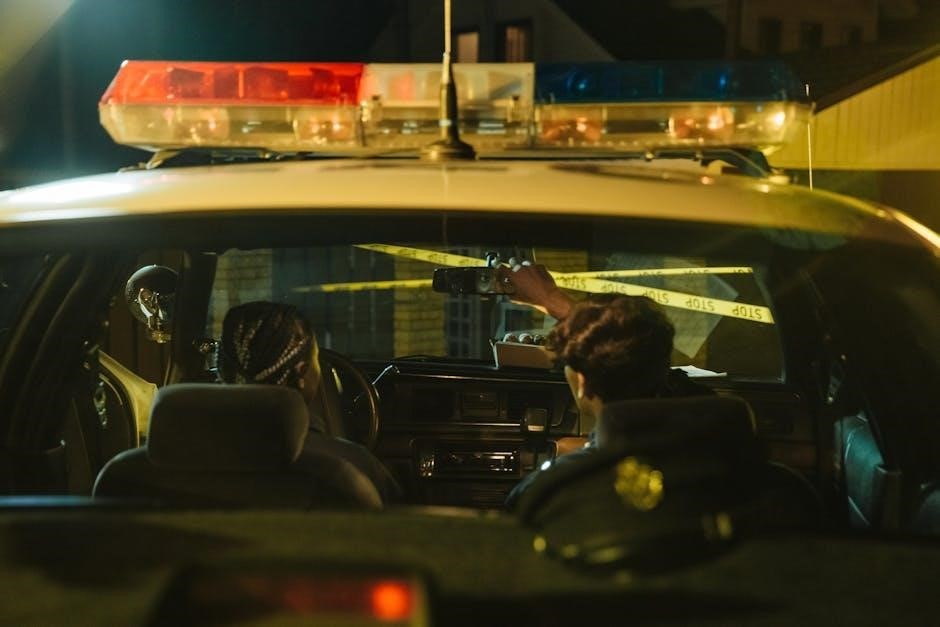
Security guards ensure safety, prevent threats, maintain visibility, monitor activities, observe and report incidents, respond to emergencies, collaborate with teams, manage access, and document events effectively.
Prevention of Security Threats
Security guards are instrumental in preventing threats by identifying potential risks and implementing measures to mitigate them. This includes monitoring suspicious activities, securing access points, and ensuring compliance with safety protocols. By maintaining vigilance, guards can address issues before they escalate, safeguarding premises and personnel. Their proactive approach helps minimize risks, ensuring a secure environment. Regular patrols and inspections are conducted to identify vulnerabilities, allowing for timely interventions. Guards also collaborate with other security personnel to share intelligence and strategies, enhancing overall threat prevention efforts. Their role is critical in maintaining a safe and protected environment for everyone. Effective prevention ensures incidents are avoided, reducing risks and potential damage. Guards must stay alert, utilizing their training and experience to anticipate and neutralize threats effectively.
Visibility and Deterrence
The visible presence of security guards acts as a powerful deterrent to potential threats, discouraging unauthorized access and illegal activities. By wearing uniforms and conducting regular patrols, guards create a strong sense of security, making premises less vulnerable to breaches. Their visibility reassures employees, visitors, and clients, fostering a safer environment. Guards also monitor surveillance systems to identify and address suspicious behavior promptly. This proactive approach not only prevents incidents but also enhances the overall perception of safety. Effective deterrence is achieved through consistent patrols, clear communication, and a professional demeanor, ensuring potential threats are discouraged before they escalate. Visibility is a cornerstone of their role in maintaining security and order.
Vigilance and Monitoring
Vigilance is a cornerstone of a security guard’s responsibilities, requiring constant alertness to detect and respond to potential threats. Guards must monitor surveillance systems, including cameras and alarms, to identify suspicious activities in real-time. Their keen observation skills enable them to recognize unusual patterns or behaviors, ensuring prompt action to prevent incidents. Regular patrols of the premises, including checking access points and equipment, further enhance security measures. By staying attentive and proactive, guards can address risks before they escalate, maintaining a safe and secure environment. Effective monitoring also involves documenting observations and communicating findings to supervisors or law enforcement when necessary. This ensures comprehensive oversight and rapid response capabilities.
Observation and Reporting
Security guards must maintain detailed records of all incidents and activities, ensuring accurate documentation for future reference. Timely reporting of suspicious behavior or security breaches is crucial, involving clear communication to supervisors or law enforcement. Guards are trained to observe and note specific details, such as unusual movements or unauthorized access, which are then included in incident reports. These reports are essential for legal compliance and internal reviews, helping to identify patterns and improve security measures. Additionally, guards must remain impartial and factual in their documentation, ensuring that all information is reliable and actionable. This practice supports transparency and accountability in maintaining a secure environment.
Seeking Assistance in Emergencies
Security guards are essential in emergency situations, acting swiftly to assess risks and contact appropriate authorities. They coordinate responses, ensuring safety and minimizing potential harm. Guards must communicate clearly with emergency services and other personnel, providing detailed information about incidents. Their role involves securing the area, guiding evacuations, and preventing further threats until professional help arrives. Effective collaboration and adherence to established protocols are critical in such scenarios. Guards must remain calm and decisive, prioritizing the protection of lives and property. Their ability to seek and manage assistance efficiently is a cornerstone of their responsibility, ensuring timely and effective resolution of emergencies.
Team Collaboration and Communication
Effective teamwork and communication are vital for security guards to ensure seamless operations. Guards must coordinate with supervisors and other personnel to share information and address threats collectively. Clear communication helps in reporting incidents, updating logs, and maintaining situational awareness. Collaboration fosters a unified approach to security, enabling guards to support each other during patrols, emergencies, and access control. Regular updates and briefings ensure alignment with team goals and protocols. Strong interpersonal skills enhance trust and efficiency within the team, contributing to a secure environment. Guards must also engage with staff and visitors, providing guidance and assistance while maintaining professionalism and approachability.
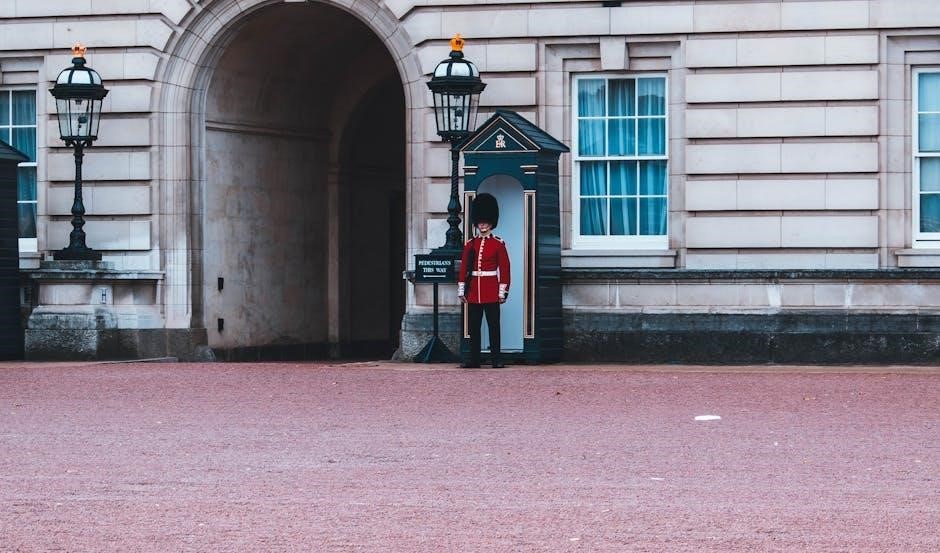
Specific Duties and Tasks
Security guards manage visitor logs, conduct safety checks, assist in evacuations, and ensure all security equipment is functional, maintaining order and compliance with protocols daily.
Patrolling Premises
Patrolling premises is a cornerstone duty of security guards, ensuring the safety and security of property and personnel. Guards conduct regular walking or vehicle patrols, monitoring for hazards, unauthorized access, or suspicious activities. These patrols are performed at varying intervals to maintain visibility and deter potential threats. During their rounds, guards inspect access points, check for safety hazards, and ensure compliance with security protocols. They also document any irregularities or incidents encountered, providing detailed reports to supervisors. Effective patrolling requires vigilance, attention to detail, and the ability to respond swiftly to emergencies, ensuring a secure environment for everyone on the premises.
Access Control Management
Access control management is a vital responsibility of security guards, ensuring only authorized individuals enter restricted areas. Guards verify identities through ID checks, gate passes, and access badges, maintaining detailed logs of all entries and exits. They operate security systems such as turnstiles and electronic locks, granting or denying access based on predefined protocols. Guards also manage visitor sign-in processes, issuing temporary passes and ensuring compliance with security regulations. Effective access control prevents unauthorized entry, reduces theft risks, and maintains the overall security of the premises. Guards must remain alert and enforce policies consistently to safeguard sensitive areas and assets from potential breaches.
Monitoring Surveillance Equipment
Monitoring surveillance equipment is a key responsibility of security guards, ensuring real-time observation of premises to detect and prevent potential threats. Guards closely watch CCTV cameras, alarms, and motion detectors, identifying suspicious activities or breaches. They check equipment functionality regularly to avoid malfunctions and ensure continuous coverage. Upon detecting incidents, guards take immediate action, such as alerting teams or initiating lockdowns. Accurate monitoring enhances safety, deters criminal activity, and enables prompt responses to emergencies. This role requires attention to detail and proficiency in using technology to maintain a secure environment effectively, ensuring the protection of people, property, and assets at all times.
Inspecting Buildings and Property
Inspecting buildings and property is a fundamental duty of security guards to identify and mitigate potential risks. They conduct regular checks for safety, security, and fire hazards, ensuring all areas are secure. Guards examine access points, locks, and equipment to prevent unauthorized entry or damage. During inspections, they report issues to supervisors and take corrective actions. This proactive approach helps maintain a safe environment, prevent theft, and protect assets. Regular inspections are vital for upholding security protocols and ensuring compliance with safety standards, making them an essential part of a guard’s responsibilities to safeguard the premises and everyone within them effectively.
Responding to Emergency Situations
Security guards are trained to respond swiftly and effectively during emergency situations, ensuring the safety of people and property. They act as first responders in cases of fires, medical emergencies, or security breaches. Guards coordinate with emergency services, operate alarms, and guide evacuations when necessary. Their role includes containing situations to prevent escalation and minimizing damage. Effective communication and teamwork are critical in such scenarios. Guards also assist in investigating incidents post-emergency to determine causes and prevent future occurrences. Their prompt actions help restore order and maintain a secure environment, making them indispensable in crisis management and ensuring timely resolution of emergencies. Their responsibilities include documenting incidents for further review and implementing safety protocols to avoid recurrence.
Visitor and Vehicle Management
Security guards are responsible for managing the flow of visitors and vehicles within the premises. This includes verifying identities, issuing visitor passes, and ensuring all individuals comply with access protocols. Guards monitor entry and exit points to prevent unauthorized access and maintain detailed logs of all visitors and vehicles. They guide visitors to designated areas and ensure adherence to safety and security regulations. Effective management of visitors and vehicles helps prevent potential threats and ensures a secure environment. Guards also assist in directing vehicles, managing parking, and coordinating with other security personnel to maintain order and safety within the facility.
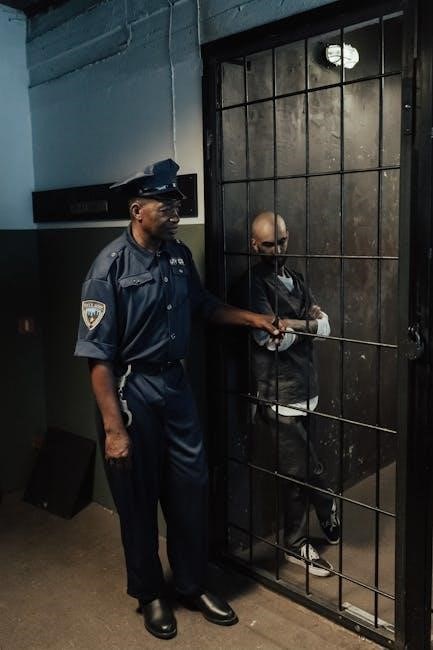
Documentation and Reporting
Security guards maintain detailed incident reports, log daily activities, and prepare shift handover reports to ensure accurate documentation and seamless communication of security-related events and updates.
Maintaining Incident Reports
Security guards are responsible for accurately documenting and maintaining incident reports, ensuring all security-related events are recorded promptly and thoroughly. These reports detail incidents such as theft, accidents, or breaches of security, providing a clear account of what occurred, the actions taken, and any follow-up measures. Guards must ensure the accuracy and timeliness of these records to aid in investigations and maintain accountability. Incident reports also serve as vital documentation for legal purposes, helping to protect both the organization and the security team. Proper maintenance of these records is essential for upholding professionalism and ensuring a secure environment for all personnel and property.
Logging Security Activities
Logging security activities is a fundamental task for security guards, involving the detailed documentation of daily security operations, patrols, and incidents. This includes recording the timing and outcomes of patrols, monitoring surveillance systems, and noting any unusual occurrences or potential threats. Accurate logs help maintain accountability, ensuring all activities are tracked and reviewed for compliance with protocols. They also provide a chronological record of events, which can be crucial for investigations, audits, or legal proceedings. By systematically logging activities, security guards contribute to a transparent and organized approach to securing premises, personnel, and assets, while demonstrating professionalism and adherence to established procedures.
Preparing Shift Handover Reports
Preparing shift handover reports is a vital responsibility for security guards, ensuring seamless communication between shifts. These reports document all significant events, incidents, and ongoing issues during the shift, providing the next team with essential information. They include details such as unusual activities, completed patrols, equipment status, and any unresolved matters. Accurate and comprehensive handover reports facilitate continuity in security operations, enabling the incoming shift to address potential risks effectively. This process also helps in maintaining accountability and ensuring that no critical details are overlooked, contributing to the overall efficiency and safety of the premises and personnel under their protection.
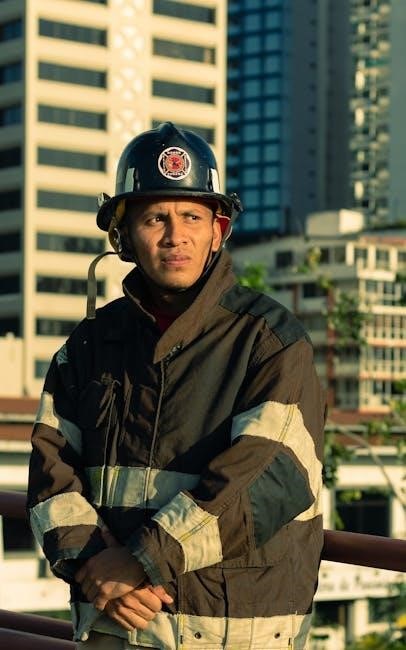
Legal and Ethical Considerations
Security guards must comply with legal standards, adhere to ethical practices, respect human rights, and maintain confidentiality to uphold professional integrity and public trust.
Compliance with Security Laws
Security guards must adhere to local, state, and federal security laws, ensuring all actions align with legal standards. This includes understanding regulations related to access control, surveillance, and emergency response. Compliance minimizes legal risks and ensures operations are conducted ethically; Guards must stay informed about updates to security legislation and industry-specific laws, such as those governing armed personnel or hazardous facilities. Proper documentation and reporting are essential to demonstrate adherence to legal requirements. By following established protocols, security personnel maintain professionalism and respect for human rights, fostering trust and legitimacy in their roles. Legal compliance is non-negotiable in safeguarding premises and personnel effectively.
Respect for Human Rights
Security guards are required to respect and protect human rights while performing their duties. This involves avoiding actions that infringe on individuals’ freedoms and ensuring fair treatment of all persons. Guards must operate in a non-discriminatory manner, respecting privacy and dignity. Training on human rights principles is essential to guide ethical conduct. It is crucial to balance security measures with the rights of individuals, ensuring that interventions are proportionate and lawful. Respecting human rights fosters a safe and inclusive environment, enhancing public trust in security services. Adherence to these principles is a cornerstone of professional and responsible security practices, aligning with legal and ethical standards.
Confidentiality and Data Protection
Security guards must uphold confidentiality and data protection standards while performing their duties. Handling sensitive information requires strict adherence to privacy policies and data protection laws. Guards should avoid unauthorized access or disclosure of personal or confidential data. Ensuring secure storage and transmission of records is vital. Training on data protection protocols helps prevent breaches. Confidentiality fosters trust between security personnel and the individuals they protect. Any violation can lead to legal consequences and damage to professional reputation. Thus, maintaining confidentiality is essential for ethical and responsible security practices, ensuring the safeguarding of personal and organizational information.
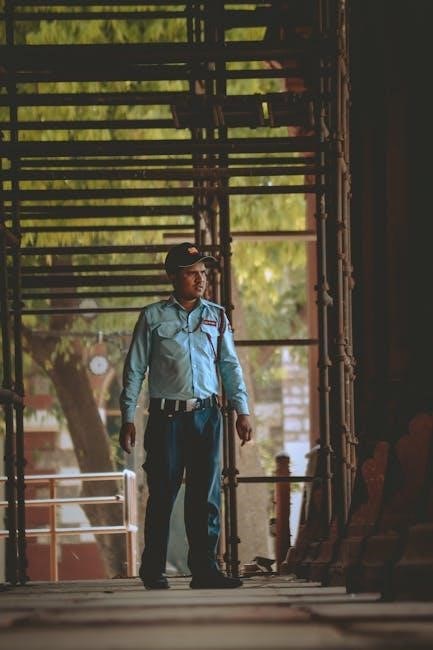
Team Roles and Collaboration
Security guards collaborate with supervisors and other personnel to ensure effective security protocols, fostering a coordinated approach to maintain safety and address potential threats efficiently.
Working with Supervisors
Security guards must maintain professional communication with supervisors to ensure effective security operations. They follow directives, report incidents, and seek guidance to align with organizational goals. Collaboration ensures adherence to protocols, fostering a safe and secure environment. Guards provide feedback to supervisors, enabling informed decision-making and continuous improvement of security practices. Regular updates and clear reporting channels help supervisors assess risks and allocate resources efficiently. This teamwork enhances overall security strategies, ensuring guards are equipped to handle challenges and maintain order. By working closely with supervisors, security personnel contribute to a well-coordinated and responsive security system.
Coordinating with Other Security Personnel
Effective coordination with other security personnel is essential for maintaining seamless security operations. Security guards collaborate with team members to share intelligence, monitor premises, and respond to incidents collectively; This teamwork ensures comprehensive coverage of all areas, minimizing vulnerabilities; Guards often work in shifts, requiring precise handovers of duties and information. By communicating effectively, they ensure continuity in security measures. Coordination also involves assisting colleagues during emergencies, providing backup, and sharing equipment or resources when needed. This collective effort strengthens overall security strategies, ensuring a proactive and unified approach to safeguarding people, assets, and property. Strong teamwork is vital for achieving security objectives efficiently.
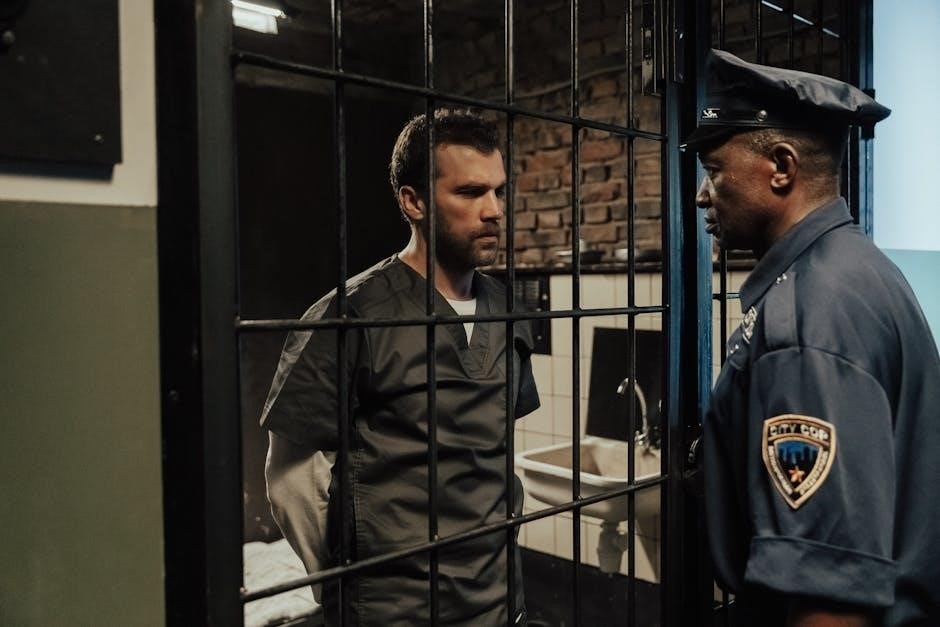
Best Practices for Effective Security Work
Staying alert, using technology wisely, maintaining a professional appearance, and fostering strong teamwork are essential for effective security work, ensuring safety and efficiency in all operations.
Staying Alert and Focused
Staying alert and focused is paramount for security guards to detect potential threats and respond swiftly. Avoiding distractions and maintaining mental sharpness ensures effective surveillance and immediate action. Guards must remain observant, monitoring surroundings and identifying suspicious activities. Regular training and mindfulness practices can enhance alertness. Detailed record-keeping of observations and incidents is also crucial for maintaining accountability and improving security protocols. By staying vigilant, security personnel can prevent risks and ensure a safe environment, adhering to professional standards and legal requirements. Continuous focus on duty ensures the safety of people and property, making it a cornerstone of effective security work.
Using Technology Effectively
Security guards must effectively utilize technology to enhance their duties, such as surveillance cameras, access control systems, and communication devices. These tools improve vigilance and response times, ensuring better protection of premises. Guards should be trained to operate equipment like CCTV monitors and alarm systems, enabling them to detect and address threats promptly. Additionally, using software for incident reporting and logging activities streamlines documentation and maintains accountability. Leveraging technology not only modernizes security practices but also increases efficiency, allowing guards to focus on critical tasks like monitoring and emergency response. Proper use of technological resources is essential for maintaining a secure and organized environment.
Maintaining Professional Appearance
Maintaining a professional appearance is crucial for security guards, as it reflects their credibility and authority. Wearing proper uniforms, nametags, and identification ensures visibility and trustworthiness. Guards should ensure their attire is clean, well-fitted, and adheres to company standards. Personal grooming, such as neat hairstyles and trimmed beards, contributes to a polished look. A professional appearance fosters respect from clients, visitors, and colleagues, enhancing their ability to perform duties effectively. It also demonstrates commitment to their role and the organization’s image. Proper attire and grooming are essential components of a security guard’s professionalism and effectiveness in their responsibilities.
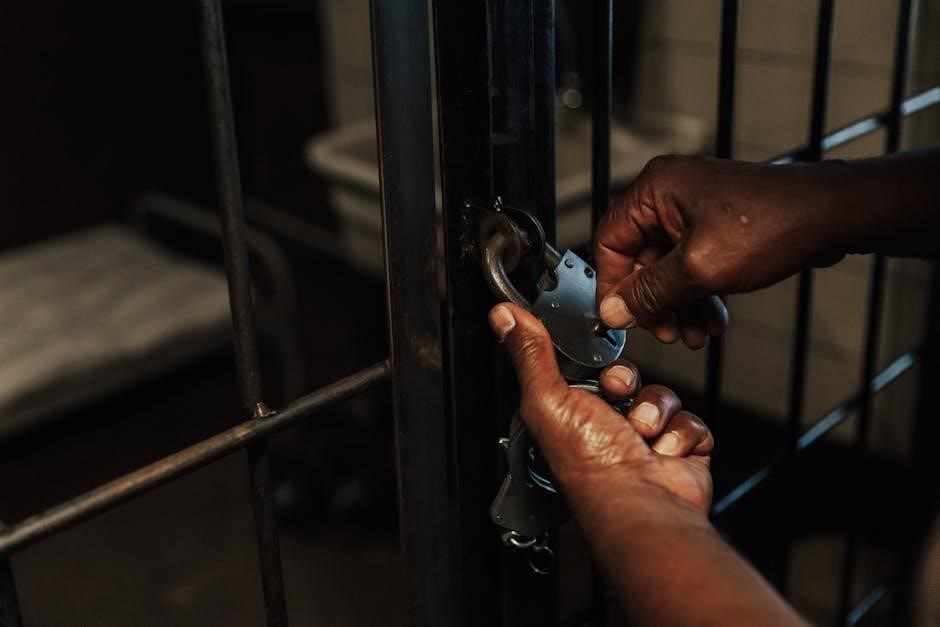
Tools and Equipment for Security Guards
Security guards utilize essential tools like surveillance cameras, access control systems, and communication devices to monitor premises, manage entry, and respond effectively to incidents.
Surveillance Cameras
Surveillance cameras are a cornerstone in modern security systems, enabling security guards to monitor premises effectively. These cameras provide real-time visibility of all areas, helping to detect and prevent potential threats. They are strategically placed in high-risk zones such as entrances, exits, and sensitive areas to ensure comprehensive coverage. Advanced systems often include features like motion detection, night vision, and video recording, which enhance their utility in maintaining security. Security guards rely on these cameras to identify suspicious activities, investigate incidents, and coordinate responses. By integrating surveillance cameras with other tools, guards can create a robust security framework that ensures safety and deters criminal activities.
Access Control Systems
Access control systems are essential tools for managing entry and exit points within secured premises. These systems ensure that only authorized individuals can access specific areas, reducing the risk of unauthorized breaches. Security guards are responsible for operating and monitoring these systems, which may include electronic ID cards, biometric scanners, or keypad entry devices. They verify credentials, issue visitor passes, and maintain logs of all entries and exits. Access control systems also help in tracking movement within the premises, enabling quick responses to potential security violations. By managing these systems, security guards play a pivotal role in safeguarding sensitive areas and preventing unauthorized access effectively.
Communication Devices
Communication devices are vital tools for security guards to maintain effective coordination and response during their duties. These devices include two-way radios, mobile phones, and emergency alarms, ensuring real-time connectivity with team members and supervisors. Security guards use these tools to report incidents, receive updates, and call for backup in critical situations. Proper use of communication devices enhances situational awareness and ensures a swift response to emergencies. Guards are trained to operate these devices efficiently, maintaining clear and precise communication to avoid misunderstandings. Reliable communication systems are essential for maintaining security protocols and ensuring the safety of personnel and premises. They are indispensable in modern security operations.
